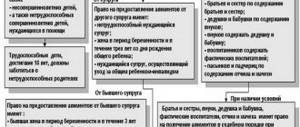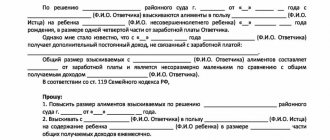Child support and paternity
Parents are obliged to support their own children, including by paying them alimony. According to Art. 53 of the Family Code of the Russian Federation, even if children are born out of wedlock, they have every right to receive such maintenance. However, the obligation for such maintenance arises on the basis of the origin of the child, therefore, if the man is not registered as the father, the collection of alimony from him is impossible.
Establishing paternity is the process of establishing the parentage of a child, particularly his father. According to the general rule established by Art. 48 of the RF IC, the father is the mother’s husband if the child was born in marriage or within 10 months from the moment of its breakup or annulment. If the persons who are the biological parents were not married at the time of birth, paternity can be established by submitting a joint application to the registry office - in this case, the applicant will become the official father.
Moreover, if the child’s mother is missing, died or declared incompetent, the biological father can submit such an application himself if he has the appropriate permission from the guardianship authorities or the court. Find out more about the paternity establishment procedure.
Grounds for determining paternity
Alimony payments are levied on fathers who have given their voluntary consent, or are compulsory through the court. Moreover, this happens automatically if the biological parent is indicated in the “father” column of the child’s birth certificate. The absence of this record is the reason for establishing paternity.
The fact is that the court cannot award alimony payments without official recognition of the child's father. The basis for this is:
- single mother status: the woman has never been married; if 3 years or more have passed since the divorce;
- cohabitation of the child's biological parents without indicating the father in the documents.
Legislation
The legal framework for establishing paternity is determined by the Family Code. In particular, Chapter 10 of the Family Code defines the general rules and conditions for establishing paternity, the specifics of the procedure, the rules for making records about parents, and the procedure for challenging paternity.
An equally important role is played by the Federal Law of November 15, 1997 No. 143 “On Acts of Civil Status”: in particular, Chapter VI outlines the grounds for state registration of paternity establishment, the procedure for its implementation, the place of registration, consequences, and so on.
In addition, it is impossible not to note the Decree of the Government of the Russian Federation of October 31, 1998 No. 1274: it approved the forms of application forms that must be submitted to the registry office when establishing paternity.
If I have a child with a disability, is he entitled to additional benefits?
If the child has a disability of 2-3 groups, the father will be obliged to pay alimony in a larger amount to cover the costs of additional medical care for the disabled person or providing him with the necessary medications. If the child has a disability of the 1st group or incapacity, then the payer is obliged to pay funds not only for the maintenance of the child, but also about 50% of the amount of alimony to his mother.
Can I count on alimony, being the mother of a child from a father with whom we were not married? How much do they pay me?
Regardless of whether the parents were ever married or not, alimony is also paid to the mother of a child under three years of age if she is on maternity leave. Naturally, this applies exclusively to alimony regarding the biological children of the alimony payer. However, if the child is incapacitated and the mother must sacrifice her employment to provide adequate care for the child, then child support may be paid for life for the mother or child if no additional income is received.
Establishing paternity if the father is against it
Individuals who are biological fathers do not always voluntarily acknowledge their paternity. In this case, the provisions of Art. 49 of the RF IC provides for a judicial procedure for determining the origin of a child. Not only the mother, but also the guardian, trustee, and also the breadwinner who is dependent on the minor has the right to initiate it. In this case, the applicant will have to prove the paternity of the defendant. To do this, you will have to provide evidence confirming the origin of the child from a specific subject.
According to paragraph 19 of the resolution of the Plenum of the Supreme Council of the Russian Federation dated May 16, 2021 No. 16, such evidence may be explanations of the parties and other persons, witness facts, documentary and visual evidence, photographs, video recordings, audio recordings, and so on.
How is paternity established by DNA?
The study is carried out on the basis of obtained biomaterials - saliva, hair, blood. The most common method, which is also practiced in Russia, involves DNA testing using oral swab material.
To conduct the study, samples are taken from the child and the possible parent, and sometimes biomaterials from the mother are also needed. In our center you can find out for free which samples will be required in your particular case.
After obtaining samples in the laboratory, the lucuses are compared and the frequency of matches is established. As a result of decoding, the maximum match can be 99.999999% , which confirms blood relationship, or the answer can be 100% negative.
Mother's procedure
If the biological father refuses to voluntarily acknowledge paternity, it will have to be established, as we have already said, in court. In this case, the child’s mother is recommended to adhere to the following procedure:
- Collection of necessary documents, preparation of evidence.
- Preparation of a statement of claim.
- Payment of state duty.
- Filing a claim in accordance with jurisdiction.
- Attending court hearings, supporting claims in the process.
- Obtaining a court decision giving the right to petition for alimony.
Since this process is associated with a lot of features, we consider it advisable to consider the main aspects in more detail.
How to file a claim correctly
First of all, the application to the court must comply with the requirements of Art. 131 of the Civil Procedure Code of the Russian Federation, according to which the following mandatory information is indicated:
- name of the court;
- personal data of the plaintiff and defendant;
- what is the violation or non-observance of rights;
- the circumstances with which the plaintiff substantiated his claims;
- the actual requirements themselves;
- an indication of the pre-trial procedure for resolving the dispute;
- list of documents.
Simply put, in addition to the mandatory data, the claim itself must describe in detail specific factual circumstances and situations, indicate the time period during which the relationship with the child’s biological father took place, emphasize the father’s refusal to recognize the identity of his own child, and also refer to the requirements of the law. If you do not have the necessary skills to draw up a statement of claim, it is recommended that you contact a lawyer.
Before filing a claim, it is important not to forget to pay the state fee for filing a claim. Since this claim is of a non-property nature, the amount of the state duty, in accordance with paragraph 3 of paragraph 1 of Art. 333.19 of the Tax Code of the Russian Federation is 300 rubles. Cases on establishing paternity, according to paragraph 4 of the resolution of the Plenum of the Armed Forces of the Russian Federation dated May 16, 2017 No. 16, are subject to the jurisdiction of district courts. According to Part 3 of Art. 29 of the Code of Civil Procedure of the Russian Federation, such a statement of claim may be filed by the plaintiff in the district court at his place of residence.
The plaintiff can file a statement of claim in person, by sending it by mail or through a representative who has the appropriate power of attorney. In this case, it is important to obtain confirmation of filing, which can be either a postal notification of receipt of the parcel with the application, or a copy of the claim with a note from the office about its acceptance.
Package of documents
Along with the claim, the applicant must provide a package of documents in accordance with Art. 132 Code of Civil Procedure of the Russian Federation:
- copies of the claim in accordance with the number of defendants;
- receipt of payment of state duty;
- copy of the passport;
- a copy of the child's birth certificate;
- documents confirming the circumstances specified in the claim;
- evidence of the defendant’s paternity, which can be presented both on paper and electronic media.
The list of documents must be reflected in the statement of claim. Please note that the court accepts any evidence that reliably indicates the origin of the child from the defendant.
Features of the trial
When considering claims to establish paternity, the court is guided by the provisions of the Family Code of the Russian Federation, as well as the explanations of the Plenum of the Armed Forces of the Russian Federation, approved by resolutions of October 25, 1996 No. 9 and of May 16, 2017. No. 16.
Judges make their conclusions based on the evidence provided by the parties. If they do not provide a complete understanding of the situation and do not allow one to find out the origin of the child, the court, taking into account the prevailing circumstances and the positions of the parties, has the right to order a genetic examination, which will determine paternity as accurately as possible.
The court cannot base its conclusions solely on the results of the examination - it is considered only as one of the pieces of evidence that must be considered in its entirety.
If the father ignores the court decision to conduct an expert analysis and does not provide the necessary samples for its conduct, then, according to Part 3 of Art. 79 of the Code of Civil Procedure of the Russian Federation, this gives the court the right to recognize the fact of paternity as such. However, making such a decision is individual in each case and requires the study of specific facts confirming the impossibility of conducting an analysis or the presence of obstacles for the defendant to do so.
Based on the results of the consideration, the court makes a decision that establishes paternity or refuses to establish it in relation to a specific subject. If such a decision does not satisfy any of the parties, it has the right to appeal it to the appellate authority.
According to the general rule established by Art. 154 of the Code of Civil Procedure of the Russian Federation, the period for consideration of such cases should not exceed two months, but in practice it will depend on the specifics of the case. Thus, when expert examinations are ordered and the defendant prevents the examination, the process can take more than six months.
Correctly drafting an application to the court
To obtain a positive court decision, it is necessary to correctly fill out the statement of claim. According to the 2021 sample, it must contain:
- the name of the judicial authority where the claim is filed;
- Full name and residential address of the plaintiff and defendant;
- title: “Statement of claim to establish paternity and collect alimony”;
- description of the circumstances of the case: explanation of why the child’s father is not officially recognized as such, whether he provides any assistance, etc.;
- listing the evidence why the defendant should be recognized as the father of the child: conducting a genetic examination, confirming the fact of cohabitation and housekeeping;
- the plaintiff's demands: to establish the defendant as the father, to collect alimony (with justification for the amount);
- indication of data of witnesses who are ready to speak in support of the plaintiff;
- a list of attached documents: two copies of the claim, the child’s birth certificate, the results of a medical examination, certificates of income, cohabitation, photographs and other documents that the plaintiff deems necessary to attach;
- date and signature.
Mothers are often interested in the question of whether they can collect child support for previous years. The law does not allow this, since officially, until the court decision is made, the defendant is not the father of the child.
How to file for child support and paternity at the same time
Let us note that many single mothers are interested in how to sue for child support if paternity has not been established, because not everyone has the means to support the child while the case is being considered. Civil procedural legislation does not prohibit the presentation of several demands against the defendant in a lawsuit. This suggests that a demand to collect alimony from the defendant can be filed with the court in parallel with a demand to establish the origin of the child. Simply put, the law allows you to sue for child support and paternity at the same time, in one lawsuit.
In this case, the plaintiff must act in a manner similar to the above. There is no additional need to pay another state fee for collecting alimony. One state fee for establishing paternity is enough - 300 rubles. If a positive court decision is received, an additional state fee of 150 rubles will be collected from the defendant. If the court does not satisfy the claim, then the plaintiff himself will have to pay this state fee.
If such a claim is satisfied with several demands considered simultaneously, the decision regarding the assignment of alimony, in accordance with Art. 211 of the Code of Civil Procedure of the Russian Federation, executed immediately. Collection in such enforcement cases is carried out by bailiffs without delay, without granting the right to voluntary execution.
Subtleties and nuances of a DNA test for obtaining child support from the father
In order for the results of the examination to have the force of a legal document and be accepted for consideration in court, certain conditions must be met:
- the documents must record the personal data of all participants in the examination;
- Sample collection from participants must be carried out by an independent qualified expert;
- the results of the study must be prepared on a form, certified by the signature of the responsible person and seal.
Legal consequences of establishing paternity
Regardless of the order in which paternity was established, it is subject to state registration. To do this, the mother must wait until the court decision comes into force, and then submit it and the application to the registry office, which will carry out state registration.
After this, a child born out of wedlock acquires the same rights and obligations in relation to his parents as a child born in wedlock. It is worth noting that in this case, legal ties between the father and the child arise not from the moment the court decision enters into force, but from the moment the latter is born.
Establishing the paternity of a child using a DNA test
Medical and biological examination based on DNA analysis is the most powerful evidence of consanguinity . Its implementation makes it possible to establish paternity with a probability of 99.999999%. Such research is carried out on personal initiative or by court decision, the results are provided in the form of an official document.
Where and how to determine the paternity of a child in order to receive child support from the father? This can be done in a molecular genetic laboratory, which has a modern laboratory equipped with high-precision equipment, which guarantees accuracy and completely eliminates errors. The center’s specialists will provide a free consultation over the phone and explain in detail how the analysis is carried out and what is needed for this.
When will alimony be awarded?
According to the general rule established by Part 2 of Art. Art. 107 of the RF IC, alimony rights arise from the moment the claim is filed. According to paragraph 8 of the resolution of the Plenum of the Armed Forces of the Russian Federation dated October 25, 1996 No. 9, if a claim is filed with a simultaneous demand to establish the origin of the child and assign alimony, the latter are also awarded from the date the claim is filed in court. At the same time, it must be taken into account that in this case the possibility of calculating alimony for the past period is excluded, as allowed by paragraph. 2 hours 2 tbsp. 107 of the RF IC, since before the court decision the alimony payer was not recognized as the father.
Is it possible to return alimony if it was collected illegally?
In the legislative field, situations arise when it is possible to return alimony, but in order for the court to make a decision on this issue, irrefutable evidence is needed. They are provided for in paragraphs 2 and 3 of Article 116 of the RF IC:
- if an agreement on voluntary payment or a court decision to collect alimony was forged, and the fact of forgery was recognized by a court verdict;
- the recipient provided deliberately false information as evidence in order to obtain benefits or submitted false documents to the court;
- the payer was coerced, deceived or intimidated into admitting that he was a parent and agreeing to payments.
After studying and confirming the facts, the court makes a decision to terminate the payment of child support under a writ of execution or a voluntary agreement by the payer. The law prohibits reclaiming them. But you can claim the amount of money already paid from the person guilty of receiving unlawful benefits by filing an application in court.
Collection of alimony for the past period after paternity has been established
1. A person entitled to receive alimony has the right to apply to the court for the recovery of alimony, regardless of the period that has expired from the moment the right to alimony arose, if alimony was not previously paid under an agreement on the payment of alimony. 2. Alimony is awarded from the moment you go to court. Alimony for the past period can be recovered within a three-year period from the date of going to court, if the court establishes that before going to court, measures were taken to obtain funds for maintenance, but alimony was not received due to the evasion of the person obliged to pay alimony from paying it .
Collection of alimony when satisfying demands for establishing paternity
If, simultaneously with the claim to establish paternity, a claim for the collection of alimony is filed, if the claim to establish paternity is satisfied, alimony is awarded from the date of filing the claim, as in all cases of collection of alimony (clause 2 of Article 107 of the RF IC). At the same time, it must be taken into account that the possibility of forced collection of funds for the maintenance of the child for the past time in this case is excluded, since before the claim to establish paternity was satisfied, the defendant was not recognized as the father of the child in the prescribed manner.
When satisfying the requirements for establishing paternity and collecting alimony, considered simultaneously, it is necessary to keep in mind that the decision regarding the collection of alimony by virtue of the second paragraph of Art. 211 of the Code of Civil Procedure of the Russian Federation is subject to immediate execution (clause 8 of the Resolution of the Plenum of the Supreme Court of the Russian Federation of October 25, 1996 No. 9 “On the application by courts of the Family Code of the Russian Federation when considering cases of establishing paternity and collecting alimony”).
Collection of alimony for the past
The Certificate of the Perm Regional Court dated March 10, 2008 “On the application of legislation on alimony obligations” contains the following explanations (with examples from judicial practice of considering cases in court):
Common issues that may arise when considering and resolving cases of alimony collection are such as the timing of filing a claim in court, the collection of alimony for the past, as well as before the dispute is resolved by the court.
According to Art. 107 of the RF IC, a person entitled to receive alimony has the right to apply to the court for the recovery of alimony, regardless of the period that has expired from the moment the right to alimony arose, if alimony was not previously paid under an agreement on the payment of alimony. Alimony is awarded from the moment you apply to the court.
When submitting a statement of claim in person to the magistrate, the latter makes a note on the statement about the time of its receipt. The date of receipt of the application may not coincide with the date specified by the applicant. When an application is received by mail, the moment of application is determined by the time it is submitted to the communications organization (by the date indicated on the stamp).
The statement of claim may contain demands for the collection of alimony for the past. Alimony may be recovered for the past period within a three-year period from the date of application to the court, if the court establishes that the plaintiff, before applying to the court, took measures to obtain funds for maintenance, but alimony was not received due to the evasion of the person obliged to pay alimony (Art. 107 RF IC).
Evasion can be expressed in the fact that the obligated person objected to concluding an agreement with him on the payment of alimony, refused requests for financial assistance, concealed his location, sources and amount of income, etc. But when collecting arrears of alimony under a writ of execution or agreement, if the guilty behavior of the debtor is established, there is no time frame for the resulting debt.
The time frame for collecting alimony arrears for the past within a three-year period is valid only in cases where the alimony arrears arose for reasons not related to the guilty actions of a person, for example, due to the failure of the alimony recipient to present a writ of execution; the arrears may arise due to delays in the payment of wages in the organization, due to the fault of postal services, due to illness of the payer, etc.
This is important to know: Cancellation of a disciplinary sanction order: judicial practice
The appeal decision of the Dzerzhinsky District Court of Perm overturned the decision of the magistrate to refuse to collect alimony under Z.’s claim in favor of Z. The court made a decision to collect alimony from the defendant in favor of the plaintiff for the maintenance of her daughter, however, regarding the claims for the collection of alimony for the past a period of 3 years was refused, since the fact of the defendant’s malicious evasion from paying alimony was not established by the court.
In addition, you need to pay attention to the following. As explained in paragraph 8 of the Resolution of the Plenum of the Armed Forces of the Russian Federation dated October 25, 1996 N 9, if, simultaneously with the claim to establish paternity, a claim for alimony is filed, if the claim to establish paternity is satisfied, alimony is awarded from the moment the claim is filed in court, as well as under cases of collection of alimony (clause 2 of article 107 of the RF IC). At the same time, it must be taken into account that the possibility of forced collection of funds for the maintenance of the child for the past time in this case is excluded, since before the claim to establish paternity was satisfied, the defendant was not recognized as the father of the child in the prescribed manner.
This clarification is important for justices of the peace in cases where a claim for the recovery of child support is filed after paternity has been established, regardless of whether paternity was established by a court decision (Article 49 of the RF IC) or voluntarily by filing with the authority Civil registration records of a joint statement by the father and mother of the child. Thus, the collection of alimony for the past is limited to the time of paternity establishment.
The magistrate of judicial district No. 26 of the Motovilikha district of Perm examined L.’s claims for the recovery of alimony from N. for the maintenance of his daughter. The plaintiff motivated her claims by the fact that the court decision established the paternity of the defendant in relation to her daughter; the plaintiff asked to recover alimony for the period since the birth of the child. The magistrate concluded that the fact of the defendant’s refusal to acknowledge paternity should be regarded as the person’s evasion from paying alimony, since he was subsequently recognized as the father of the child. The collection of alimony was determined from the moment the plaintiff filed a lawsuit to establish paternity. By the ruling of the Motovilikha District Court of Perm, the decision of the magistrate was canceled, the proceedings in the case were terminated, since the appellate court found that when filing a claim to establish paternity, L. did not file any claims for alimony. She filed the application for the collection of alimony much later, she did not raise the issue of collecting alimony for the past period, the court order for the collection of alimony from the date of filing the application entered into legal force, and therefore the court, with reference to Art. 220 of the Code of Civil Procedure of the Russian Federation, the proceedings in the case were terminated, since there was a court ruling on the collection of alimony, which determined the time for collecting alimony.
So, as a general rule, alimony is awarded from the moment you go to court . At the same time, their payment in most cases begins from the day the decision is made.
The decision to collect alimony is subject to immediate execution. Provision of Art. 211 of the Code of Civil Procedure of the Russian Federation applies to all types of claims for the collection of alimony.
According to paragraph 24 of the Resolution of the Plenum of the Armed Forces of the Russian Federation dated October 25, 1996 No. 9, when changing the amount of alimony previously established by the court for children and other family members, recovery in the newly established amount is made from the date the court decision made on this enters into legal force.
When postponing the proceedings on divorce and collection of alimony for children in connection with the appointment of a period for reconciliation of spouses, it is necessary to find out whether the defendant is involved in the maintenance of children. If the court finds that the defendant does not fulfill this obligation, he has the right, in accordance with Art. 108 of the RF IC to issue a resolution on temporary collection of alimony from the defendant until the final consideration of the case on divorce and collection of alimony.
Determination of alimony arrears over the past period of time. From judicial practice
In canceling the bailiff's decision to collect from M arrears of alimony for the period since 1999, the court correctly proceeded from the fact that the debtor had presented a certificate from his place of work about income, and therefore the grounds for calculating the debt based on There was no average salary in the Russian Federation.
At the same time, the court’s conclusion that the debt for the past period of time could be collected only on the basis of a court decision and alimony should be accrued from the moment the claimant reapplies for execution of the writ of execution and the initiation of new enforcement proceedings, was made without taking into account the provisions of Art. 113 RF IC.
Clause 2 of Art. 113 of the RF IC defines cases when alimony is collected for the entire period, regardless of what is established in paragraph 2 of Art. 107 of the RF IC for a three-year period. The amount of debt, according to paragraph 3 of Art. 113 of the RF IC, is determined by the bailiff based on the amount of alimony determined by a court decision or an agreement on the payment of alimony.
Thus, the law determines the possibility of collecting debt for the past time, and the bailiff has the right to determine the amount of such debt.
From the case materials it follows that the writ of execution was being executed by the bailiff service since September 1998. In March 2002, the writ was issued to the claimant at his request. The claimant again applied for acceptance of the writ of execution for collection in March 2005, indicating that the alimony debt dates back to March 2002.
In this situation, there were no obstacles to determining the alimony debt over the past period of time, and the court’s instruction on the need to make a calculation from the moment of initiation of enforcement proceedings at the request of the claimant cannot be recognized as based on the law (Review of cassation and supervisory practice in civil cases for 2005, dated March 20 2006 of the Perm Regional Court).
This is important to know: Sample application to bailiffs for collection of arrears of alimony







